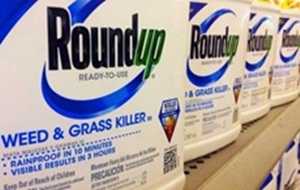A jury in San Francisco, California, on Friday ordered agro-chemicals giant Monsanto to pay nearly $290 million to a former school groundskeeper Dewayne Johnson dying of cancer, caused by the constant use of the company's popular weed killer Roundup.

The jurors were unanimous in their verdict that Monsanto acted with "malice" and that its weed killers Roundup and the professional grade version RangerPro contributed "substantially" to Johnson's terminal illness.
The jury ordered chemical giant Monsanto to pay $289 million, including $250 million in punitive damages to the dying groundskeeper, saying the company did not even care to warn the poor man that its weed killer Roundup might cause cancer.
The jury announced the penalty after eight weeks of trial proceedings.
The lawsuit filed by Dewayne Johnson was the first to go to trial among hundreds such cases filed in state and federal courts against Roundup that causes non-Hodgkin's lymphoma. In California, dying plaintiffs can be granted expedited trials.
CNN reported last year that more than 800 patients were suing Monsanto, claiming Roundup gave them cancer.
Monsanto, which denies that its weed killer, a form of glyphosate has any link with cancer, saying hundreds of studies have established that glyphosate is safe.
Jurors in state Superior Court, however, unanimously found that the Monsanto product contributed to Johnson's cancer and the company should have provided a label warning of the potential health hazard.
Johnson's attorneys sought and won $39 million in compensatory damages and $250 million of the $373 million they wanted in punitive damages.
Johnson used Roundup and a similar product, Ranger Pro, as a pest control manager at a San Francisco Bay Area school district, his lawyers said. He sprayed large quantities from a 50-gallon tank attached to a truck, and during gusty winds, the product would cover his face, said Brent Wisner, one of his attorneys.
Once, when a hose broke, the weed killer soaked his entire body.
Johnson even contacted the company after developing a rash but was never warned it could cause cancer, Wisner said. He was diagnosed with non-Hodgkin's lymphoma in 2014 at age 42.
"The simple fact is he is going to die. It's just a matter of time," Wisner told the jury in his opening statement last month.
Monsanto’s lawyer George Lombardi, however, said non-Hodgkin's lymphoma takes years to develop, so Johnson's cancer must have started well before he began working at the school district.
The US Environmental Protection Agency says Roundup's active ingredient is safe for people when used in accordance with label directions.
However, the France-based International Agency for Research on Cancer, which is part of the World Health Organization, classified it as a "probable human carcinogen" in 2015. California also names glyphosate in its list of chemicals known to cause cancer.
Monsanto issued a statement after the verdict, saying it stands by the studies that suggest Roundup does not cause cancer.
However, in March 2017, farmers and others suing Monsanto claimed in court filings, employees of Monsanto Co ghostwrote supposedly independent scientific reports that US regulators relied on to determine that a chemical in its Roundup weed killer does not cause cancer. The documents, which were made public, were part of a mass litigation in federal court in San Francisco claiming Monsanto failed to warn that exposure to Roundup could cause non-Hodgkin's lymphoma (
See: Lawsuit alleges Monsanto staff ghostwrote safety reports).
"We will appeal this decision and continue to vigorously defend this product, which has a 40-year history of safe use and continues to be a vital, effective and safe tool for farmers and others," Monsanto vice president Scott Partridge said.
An appeal would be costly for Monsanto, which would have to pay interest on the damages that have been awarded, while the case is being appealed. The interest is estimated to cost $25 million a year, he said.
Monsanto is currently owned by German chemicals and pharmaceuticals major Bayer, after it successfully completed the acquisition on 7 June 2018 following the receipt of all required approvals from regulatory authorities.
According to the conditional approval from the United States Department of Justice (DOJ), the integration of Monsanto into Bayer can take place as soon as the divestments to BASF have been completed. This integration process is expected to commence in approximately two months. Liam Condon, member of the Bayer Board of Management, will lead the combined Crop Science division when the integration commences.





















